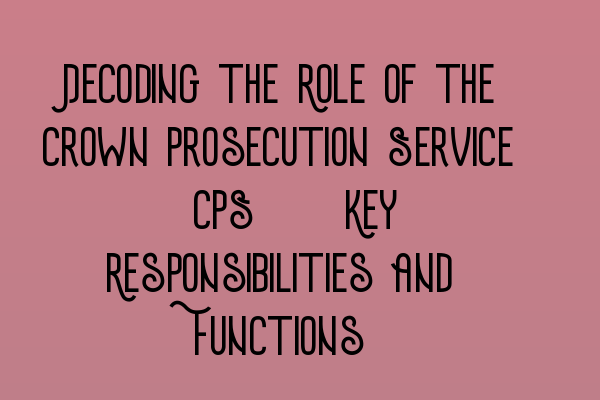Decoding the Role of the Crown Prosecution Service (CPS): Key Responsibilities and Functions
Welcome to the SQE Criminal Law & Practice Law UK blog! In today’s post, we will be discussing the role of the Crown Prosecution Service (CPS) and its key responsibilities and functions. The CPS plays a crucial role in the criminal justice system, acting as the public prosecutor in England and Wales. Understanding the role of the CPS is essential for anyone involved in criminal law. So, let’s dive in!
What is the Crown Prosecution Service (CPS)?
The Crown Prosecution Service (CPS) is an independent public authority responsible for prosecuting criminal cases investigated by the police in England and Wales. Established in 1986, the CPS operates under the code for Crown Prosecutors, which sets out the principles that govern its decision-making process.
The CPS works closely with the police, providing legal advice during investigations and making decisions on whether or not to charge individuals with criminal offenses. The CPS also represents the public interest in court by presenting cases and advocating for justice.
Key Responsibilities of the Crown Prosecution Service
The CPS has several key responsibilities in the criminal justice system. These include:
- Examining evidence: The CPS carefully examines the evidence presented by the police for each case. This includes reviewing witness statements, forensic reports, and other relevant information.
- Legal decision-making: Based on the evidence gathered, the CPS makes informed decisions on whether there is sufficient evidence to prosecute an individual. They also consider whether it is in the public interest to proceed with the prosecution.
- Preparing and presenting cases: If the CPS decides to prosecute, they are responsible for preparing and presenting the case in court. This involves working closely with witnesses, ensuring they are supported and prepared to give evidence.
- Advocacy: CPS lawyers represent the prosecution in court, presenting the case to the judge and jury in a clear and persuasive manner. They seek to secure convictions and act as a voice for victims and the wider public.
- Reviewing cases: The CPS also reviews cases that have already been prosecuted to ensure that justice has been served. They may consider appealing against lenient sentences or incorrect legal decisions.
Importance of the Crown Prosecution Service
The CPS plays a vital role in the criminal justice system, ensuring that individuals who commit crimes are held accountable for their actions. The CPS operates independently from the government and the police, ensuring that decisions regarding prosecutions are made objectively and in the best interest of justice.
By examining evidence and making informed decisions, the CPS helps to maintain the integrity of the criminal justice system. They work to ensure that cases are prosecuted fairly and that defendants receive a fair trial.
Conclusion
The Crown Prosecution Service (CPS) has a pivotal role in the criminal justice system in England and Wales. They are responsible for deciding whether to prosecute individuals based on the evidence presented by the police. With their key responsibilities of examining evidence, making legal decisions, preparing and presenting cases, advocating for justice, and reviewing cases, the CPS ensures that justice is served and the public interest is protected.
Thank you for reading our blog post on the role of the Crown Prosecution Service. We hope you found this information helpful. If you have any questions or would like to learn more about criminal law and practice, please don’t hesitate to get in touch with SQE Criminal Law & Practice Law UK.
Related Articles
- Demystifying the Solicitors Qualifying Examination Format
- LLC Formation Made Simple: Step-by-Step Guide for UK Entrepreneurs
- LLC Formation: A Step-by-Step Guide for UK Entrepreneurs
- Business Regulations in the UK: A Comprehensive Overview
- Ethical Considerations in UK Law: Upholding Professional Standards
